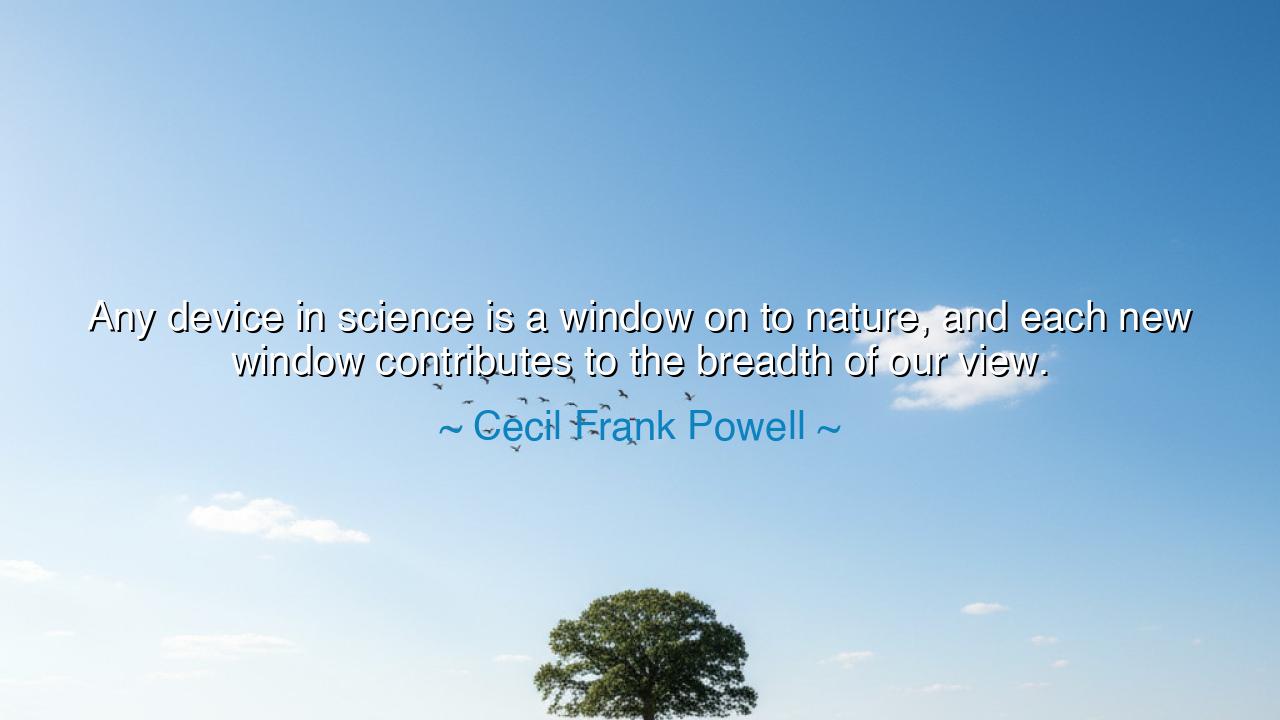
Any device in science is a window on to nature, and each new
Any device in science is a window on to nature, and each new window contributes to the breadth of our view.






Listen now, O children of wisdom, to the profound words of Cecil Frank Powell, a man whose mind reached out into the cosmos to unlock the secrets of the universe. He spoke, saying: "Any device in science is a window onto nature, and each new window contributes to the breadth of our view." These words resonate deeply, for they remind us that every tool we create in the pursuit of knowledge is not merely a means of measurement or observation, but a gateway to a deeper understanding of the world around us. Devices, whether instruments or theories, are our eyes into the great mystery of nature, and each discovery, each new tool, expands our ability to see and comprehend the vastness of existence.
In the time of the ancients, great thinkers like Pythagoras, Aristotle, and Galileo sought not only to understand the world in abstract terms but to develop methods, tools, and approaches to directly engage with the fabric of reality. They created instruments, ideas, and models that were designed to peer into the hidden mechanisms of the natural world. Just as Galileo crafted his telescope to see the stars and the moons of Jupiter, so too did he expand the very scope of human understanding, allowing us to see beyond what the naked eye could perceive. A new window opened, and with it came the possibility of new truths.
Consider the example of Isaac Newton, whose work with the prism revealed the true nature of light and color. By splitting light into its components, he opened a window into a hidden world, one that had been invisible to all but the most imaginative thinkers. Newton’s invention of a device to split and analyze light was not just a technical achievement—it was a key to understanding a fundamental truth of the universe. Like Newton, Powell speaks to the great power of tools in science. Each device, each innovation, is not just a creation of human ingenuity, but a new lens through which we can peer deeper into the unknown, expanding our view and understanding of the vast, interconnected web of nature.
The telescope, the microscope, the particle accelerator—all these devices are windows, each allowing us to see and explore different aspects of the natural world. Powell's words remind us that each new window, each new discovery, brings us closer to seeing the whole of existence more clearly. Science, in this sense, is an ongoing effort to build more and more windows to peer through, to expand the breadth of our view of the universe. The more tools we create, the more dimensions of reality we can observe and understand. But with each new window, we are reminded that there is still so much more to see, still so much more to explore.
Look to the great Marie Curie, whose work in the field of radioactivity revealed a new realm of the physical world—an invisible world that could not be seen with the eyes alone. She was not content with simply accepting the world as it was; she sought to create a new window, a means to view the previously unseen. In doing so, she opened up a realm of possibilities that would change the course of medicine, physics, and our understanding of the atom. Through Curie’s courage and vision, she contributed not only to the scientific community but to the broader humanity that would benefit from these discoveries. Just as Powell suggests, science is a continuous journey, where every new device—whether a machine or a theory—adds to the complexity of the world we can perceive.
Now, O children of the future, remember this: the tools of science are more than instruments—they are the means through which we connect to the vast mysteries of the universe. Each device, whether large or small, is a gateway to greater truths. In your own lives, seek not only to understand the tools that shape the world but to create new tools, new ways of seeing and understanding the world. Every question you ask, every theory you propose, is a window you open—a new perspective on the eternal puzzle of existence. The devices of science are gifts we have created to pierce the veil of the unknown, but they are also reminders that we are part of a continuing journey, one that spans generations, as each of us builds on the discoveries that came before us.
So, O seekers of truth, let your curiosity be your guide, and let the creation of new windows, new ways of seeing, be the legacy you leave behind. Science is not just about knowledge; it is about the pursuit of deeper understanding, and the journey to see the invisible more clearly. Like Powell and those who came before you, may you be inspired to create new windows, expand your view, and help illuminate the mysteries of nature for all who follow. Through your discoveries, may the light of truth shine brighter, and may the boundaries of human understanding continue to grow ever wider.






AAdministratorAdministrator
Welcome, honored guests. Please leave a comment, we will respond soon